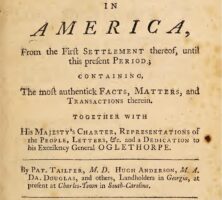From humble beginnings as an indentured servant, William Ewen rose to become one of the Georgia colony’s most respected citizens and a patriot leader during the American Revolution (1775-83), serving as the first president of the Georgia Council of Safety.
Believed to have been born in England in 1720, Ewen landed in the colony of Georgia on December 28, 1734. He was selected by the Board of Trustees to work for Thomas Causton, chief magistrate and a storekeeper in Savannah, in the Trustee store for the term of two years. Causton described him as a “Sober and Carefull Lad,” and he undoubtedly met every settler in the new colony in the course of his duties. Ewen was awarded fifty acres on Skidaway Island at the end of his indenture and, though an artisan by trade, tried his hand at farming. After several unsuccessful years, he was forced to give up his farm and returned to Savannah in 1740. Finding work in the private store of John Bromfield, he became involved with the discontented settlers of Georgia—known as Malcontents —who took issue with the policies of the Trustees. Dubbed a “virulent mischief maker” by Trustee secretary William Stephens, Ewen emerged as a voice and leader of the Malcontents. He served with Thomas Stephens on a committee to propose changes in the administration of the colony to the Board of Trustees.

From A True and Historical Narrative of the Colony of Georgia in America, by P. Tailfer
The decade following the end of Trustee rule is described as one of significant growth for Georgia. Ewen acquired more land during this time and began to be appointed to several important posts, such as commissioner for the town of Ebenezer, superintendent for Savannah, and later vendue master, or auctioneer, for the colony. Moreover, he was a leader in the Anglican Church in Georgia, holding several offices for the parish of Christ Church. Sometime before 1760 (the exact date being unknown) Ewen wed Margaretha Waldhauer of the Salzburger settlement in Ebenezer.
Ewen was elected to the Commons House of Assembly on March 25, 1761. The assembly from 1761 to 1764 worked closely with the new governor, Sir James Wright, to improve government and increase trade. In March 1765 Ewen prepared a bill to impose duties on a number of articles imported from other continental colonies in an effort to allow the Lower House to assume more governmental power. However, news of the Stamp Act (1765) reached the colony and ignited a revolutionary movement, with Ewen at the forefront, both officially in his capacity in the assembly and unofficially as a Son of Liberty at Tondee’s Tavern. By the end of January 1775, Ewen, with many others, signed the Continental Association, adding Georgia to the united stand against the rule of Great Britain.
On June 22, 1775, Ewen was elected president of the Georgia Council of Safety, which met for the first time on July 4, at the convening of the First Provincial Congress in Savannah. The council comprised sixteen members and was charged with conducting the affairs of opposition against royal rule. He presided over that body during the critical months when the authority of Wright began to weaken significantly and British warships appeared in the Savannah River. Ewen’s term expired at the end of that year, and George Walton assumed the presidency until February 1776, when Elisha Butler was elected. Ewen resumed the role of president pro tempore, in the absence of Butler, for a few months. Though he lived to see Georgia declared independent, Ewen died sometime in late 1776 or early 1777, as his will, written in 1776, was probated on June 20, 1777.






